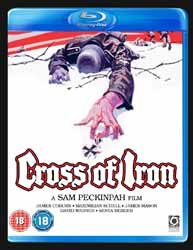|
Click here to return to the main site. Blu-ray Review
In the bleak Russian winter the Germans are in full retreat against the overwhelming Soviet forces. In this conflict two men will come to symbolise the division between empty honour and true heroism. Corporal Steiner, having completed another successful mission, is promoted to sergeant, a promotion he neither desires nor cherishes. His new company commander is an Austrian aristocrat, who has volunteered for the Russian front purely to attain the Iron Cross, a mark of bravery and one which Steiner already owns. These two men, one mired in a war and hating it and his nemesis, a preening coward collide to the detriment and death of all those around them... Cross of Iron (1977 - 2 hr, 12 min, 41 sec) is one of Sam Peckinpah’s best movies and one of the best war movies around. It is unusual from the usual run of war movies in that it is told entirely from the point of view of the Germans. Having had to endure a seemingly endless string of films which painted all Germans as Nazi sympathisers, Peckinpah chose to direct a film which dealt with war on an entirely different level. James Coburn plays Sgt. Feldwebel Rolf Steiner, a man who has little time for officers, or the war, even though his talents mean he is an exceptional soldier. His peculiar off-hand behaviour towards officers is tolerated by Col. Oberst Brandt (James Mason) and Capt. Hauptmann Kiesel (David Warner) as the Colonel owes Steiner his life. However, when Capt. Hauptmann Stransky (Maximilian Schell) joins the platoon as its commanding officer he immediately clashes with Steiner. For Stransky, the Iron Cross is a necessity, for his honour, as an Austrian aristocrat it irks him that a mere pleb like Steiner should be award such an honour. Of course, as an audience we can see Schell portray the man as a preening coward, who will even stoop as low as blackmailing his own staff, Lieutenant Triebig (Roger Fritz) when he discovers that the man is a homosexual. When the Soviets finally break through the German lines, Stransky does not give the order for Steiner's troops to evacuate, partially as revenge for Steiner not supporting his request for the Iron Cross for valour in a previous engagement, valour which belonged to another man. Stranded behind enemy lines Steiner and his surviving men must travel twenty-three kilometres to reach safety, or so they believe. Peckinpah had often been lambasted for his attitude towards violence, usually showing it in slow motion, a trick which he resurrects here and for the visceral nature of its depiction. This reputation had been built on critics’ reaction to both Straw Dogs (1971), whose rape scene is still controversial and Bring Me the Head of Alfredo Garcia (1974), which for its time was considered extremely violent. However, we live in a post Tarantino world and such violence that the film contains almost seems tame in comparison to some modern gore feasts. Both the English speaking and German cast are faultless and whilst Peckinpah intended his film to be anti-war, it in this respect that the whole enterprise fails. Not only does James Coburn do a fine job at showing Steiner as a man of depth and philosophy who is caught up in the madness of war, but he goes one step further and fails to show Steiner being finally and meaninglessly killed, thereby turning his persecuted everyman into a hero. Even Starnsky finally grows a pair and the final frames of the film could just as well be read as a vindication of violence as a way for a man to find his inner courage. The re-mastered Blu-ray disc is another wonderful presentation and given the age of the film, there is a surprising wealth of extras. The film is presented with a 1.85:1 aspect ratio, with either an English or German LPCM DTS MA audio track. Passion and Poetry - Sam Peckinpah’s War (46 min) has many of the surviving cast and crew talking honestly about the film. There are not many documentaries of this type which would allow Katy Haber to say she thought that Peckinpah should not have made the film in the first place. Most of the interviews, both old and modern also show this refreshing honesty as they detail the events surrounding the making of the film, which makes it sound more like a gonzo production than a Hollywood Blockbuster. The rest of the extras, for the most part, cover the same ground, sometimes illuminating a particular point, but once we get past the documentary the remainder are little more than vignettes. So, you get five audio interviews with Sam Pechinpah (5 min, 06 sec), James Coburn (5 min, 30 sec), James Mason (6 min, 05 sec), Maximilian Schell (4 min, 35 sec) and David Warner (3 min, 14 sec). Following on we have Kruger Kisses Kern (8 min, 27 sec), Letters from Vadim & Sam Peckinpah (3 min, 48 sec) Vadim and Sam - Son and Dad (5 min, 55 sec), Cutting Room Floor (4 min, 19 sec), Mike's Home Movies (7 min, 16 sec), Steiner in Japan (3 min) a comparison of the film before and after restoration and a bunch of trailers. Even though Pechinpah failed to make the ultimate anti-war film, he did succeed in making an impressive study of both the horrors and obsessions which drive men in war time and even today it remains an impressive endeavour. 9 Charles Packer |
|---|

